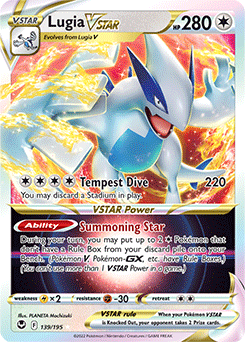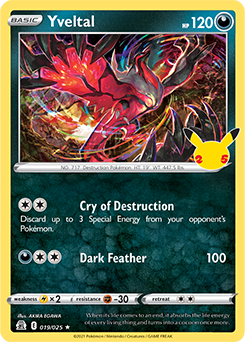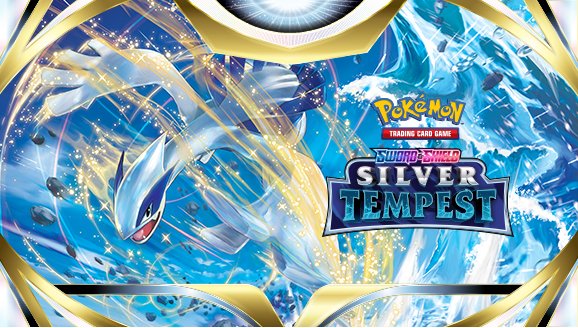Read on below to learn more about the new Pokémon TCG expansion:
The Diving Pokémon makes an instant impact in competitive play.
By Xander Pero, Contributing Writer
The debut of Sword & Shield—Silver Tempest has released an absolute behemoth into the Standard format. Rivaling the early dominance of Palkia VSTAR, Lugia VSTAR has been outperforming the crowd since its debut at the recent Latin America International Championships, where it held six of the eight spots in the Masters Division single-elimination bracket and both finalist spots.
The popular Lugia VSTAR archetype revolves around discarding two Archeops, also from Sword & Shield—Silver Tempest, and then putting them onto the Bench using Lugia VSTAR’s Summoning Star VSTAR Power. Once in play, Archeops’s Primal Turbo Ability can be used to load up required Energy on Lugia VSTAR and other attackers. The deck’s strength comes from its use of other attackers that can Prize-trade favorably. By using all attackers (including Archeops), Prize-trading is favorable against almost all opposing strategies.
The above list is what I’d consider a solid baseline for any Lugia VSTAR deck. Nothing too crazy is included, but it certainly has flair and tech cards for popular matchups. Three copies of both Lugia V and Lugia VSTAR and four copies of Archeops provide a strong foundation. You will only need one or two Lugia VSTAR in each match, whereas being able to find and discard Archeops during the early turns is one of the most important parts of your gameplan.
Yveltal and Radiant Charizard are all-around great attackers. Yveltal is a great swing attacker against any Pokémon VSTAR or VMAX, as it can take multiple Prize cards with a single attack. Almost always, the opponent must Knock Out Yveltal on their turn to prevent it from attacking with Amazing Destruction again. Radiant Charizard is also strong when it comes to Pokémon VSTAR: With a Choice Belt, Combustion Blast does 280 damage. Moreover, this damage is not reduced by V Guard Energy because Radiant Charizard is not a Pokémon V!
Now that we have coverage against larger targets via Yveltal and Radiant Charizard, we next need to think about single-Prize Pokémon. Stoutland V fulfills this purpose. With its Double Dip Fangs attack, Basic Pokémon give up an additional Prize card when Knocked Out. This is an extremely powerful tool at your disposal against Basic-oriented decks, because an unanswered Stoutland V can take four Prize cards in a blink of an eye.
Oranguru mainly serves as Marnie protection—one common strategy against Lugia VSTAR is to use Marnie plus Path to the Peak to prevent Summoning Star on turn two. In other situations, you can put an Energy on top of the deck and then attach it with Primal Turbo. This can be great when you draw multiple copies of a needed Energy, such as Aurora Energy, when preparing to attack with Yveltal.
Next up are Pumpkaboo and Manaphy. Pumpkaboo is another answer to Path to the Peak, and it can be retrieved with a Quick Ball or Ultra Ball. Manaphy has specific uses against Kyogre from Celebrations, Raikou from Sword & Shield—Vivid Voltage, Regieleki, and Radiant Greninja, which are the popular Pokémon in Standard that can damage your Bench.
The last Pokémon is Lumineon V. On top of having an awesome Ability, Lumineon V is a versatile attacker against single-Prize decks and Radiant Charizard. After retrieving a Supporter card with Luminous Sign, you can shuffle Lumineon V back into the deck with Aqua Return. Not only would you do 100 or 120 damage, but also you’d be removing the liability of having a two-Prize Pokémon on the Bench. This allows you to reuse Luminous Sign in the future, even with one copy of Lumineon V on the list. However, because its Ability is so strong and it is a solid attacker in several matchups, it’s worth playing two copies.
Four copies of Quick Ball, Ultra Ball, and Evolution Incense are included to improve the odds of setting up two Archeops on turn two. Lost Vacuum and Collapsed Stadium are answers to Path to the Peak that also have other key uses. For example, Lost Vacuum can remove Big Charm or Tool Jammer, which can put a Pokémon VSTAR or VMAX out of Knock Out range. Collapsed Stadium is a means of discarding a vulnerable Lumineon V that you cannot reshuffle with Aqua Return, and it can limit an opponent’s Bench on a crucial turn. Lastly, Choice Belt is important in picking up Knock Outs with Radiant Charizard or through V Guard Energy. To that end, there are three copies so that you’re more likely to draw them when you need them on a crucial turn.
Professor’s Research and Marnie make up the bulk of the draw engine. They offer the best raw draw power compared with other Supporters in the Standard format. Then, there are two Serena and two Boss’s Orders. Serena acts as an additional Supporter that can discard Archeops while doubling as another gust effect. You may be thinking, “why not four copies of Serena?” considering that bringing up Pokémon V is the main target. However, there may be a time when you have one Prize card left and want to target a vulnerable single-Prize Pokémon on the Bench.
Finally, there is the Energy lineup. Because Archeops’s Primal Turbo Ability can only accelerate Special Energy, the list is only comprised of Special Energy. With so many Special Energy in the format and Lugia VSTAR being a Colorless-type Pokémon, you can truly play any legal Special Energy. That being said, some are too good not to play, namely Powerful Colorless Energy and Aurora Energy.
With a little help from Powerful Colorless Energy and Choice Belt, Lugia VSTAR can reach up to 330 damage, allowing it to Knock Out almost all Pokémon VMAX. Attaching Powerful Colorless Energy to Archeops is also valuable—you can Knock Out other Archeops or Radiant Charizard with multiple Powerful Colorless Energy. On the other hand, Aurora Energy fuels every other attacker in the deck. Although discarding a card from hand may seem like a downside, it is actually a benefit because Aurora Energy is an additional way to discard Archeops on turns one and two.
Double Turbo Energy is another staple; it fulfills multiple expensive Retreat Costs and can save you in a pinch when you only have one Archeops in play. With one Archeops in play, you cannot reach four Energy on Lugia VSTAR in a single turn without Double Turbo Energy. It also provides both Energy for Yveltal’s attack cost with no downside.
Rounding out the roster are Capture Energy, V Guard Energy, and some number of additional non-Colorless Special Energy. Capture Energy aids in setup and fulfills many attack costs, whereas V Guard Energy can help protect Lugia VSTAR by forcing a Choice Belt out of the opponent. V Guard Energy also works well when attached to Yveltal because it reduces damage from Lumineon V, taking it out of the Knock Out range of Aqua Return.
Additional copies of non-Colorless Special Energy are useful in games where you attack with both Yveltal and Radiant Charizard. With only four copies of Aurora Energy, there is no room for error in supplying Yveltal and Radiant Charizard’s attack costs: Yveltal requires three and Radiant Charizard requires one. With Heat Fire Energy and Hiding Darkness Energy, there are now six copies of suitable Energy. Up to 2 Energy could be discarded, attached elsewhere, or in the Prize cards, and you could still attack with both.
Though few decks rival Lugia VSTAR’s versatility in attacker choice, opposing decks have ways of countering its specific strategy. The first glaring vulnerability is that all attackers rely on Special Energy. Duraludon VMAX’s Skyscraper Ability prevents all attack damage from Pokémon with Special Energy. Yveltal can get around this Ability and Knock Out Duraludon VMAX in a single attack, but there are still challenges. Big Parasol can eliminate the effects of attacks, too, which would prevent Amazing Destruction. The dynamics of Skyscraper, Yveltal, and Lost Vacuum are complex, but they usually favor the Duraludon VMAX player.
Another route to dealing with its reliance on Special Energy is a different Yveltal; the one from Celebrations has an attack that discards up to 3 Special Energy. If the opponent can use this attack repeatedly—perhaps aided by Sidney, Flannery, or Crushing Hammer—you might run out of Energy before taking all six Prize cards. Control-based archetypes can be incredibly powerful when tailored to beat a specific deck, and such is the case here.
Another common vulnerability is against single-Prize decks that can trade favorably against Lugia VSTAR and evenly against the single-Prize Pokémon in your Lugia VSTAR deck. One example of this is Regigigas and its Regi counterparts, which have ample types to hit each Pokémon for Weakness. If the Regigigas player takes the first Prize card and can maintain that pace for the entire game, they will win. Another example of a deck that can do this is a Lost Zone-oriented deck that makes use of Mirage Gate and additional Basic attackers.
The final vulnerability worth noting is an inability to deal with Special Conditions. With the above list, there is no way to get around being Paralyzed or Asleep. Cards such as Cheren’s Care or Bird Keeper can be added in, but doing so would eliminate other important card slots.
If these counters become popular, it may be worthwhile to add a card to counteract them. Path to the Peak can shut off Duraludon VMAX’s Ability, allowing Lugia VSTAR and other attackers to damage it. Control archetypes can be shut down by Ursaluna and its Peat Hunt attack, which can retrieve cards from the discard pile. Another option is Blissey V, which can continually energize itself even against Yveltal. Against Pokémon that hit Lugia VSTAR for Weakness, you can include Dunsparce, which can remove the Weakness from Colorless-type Pokémon. Finally, as mentioned against Special Conditions, playing switching effects or Cheren’s Care is a must.
Lugia VSTAR is an incredibly strong archetype that, with its arsenal of attackers, is well-matched against the rest of the format. There are plenty of other attackers you can experiment with. Zacian and Raikou from Sword & Shield—Vivid Voltage are great choices against Lugia VSTAR and Pokémon VMAX decks, respectively. Other Lightning types are also strong against Lugia VSTAR, provided that your opponent does not have Dunsparce. It is also possible to include Path to the Peak yourself so that you can shut off an opponent’s Summoning Star!
I hope this article inspires you to give Lugia VSTAR a try. It has already proven its strength and will continue to do so in upcoming tournaments. For more TCG strategy, continue reading Pokemon.com/Strategy.
About the Writer

Xander Pero
Xander Pero is a contributing writer for Pokemon.com. He was an avid fan until discovering sanctioned tournaments in 2009. He formerly traveled often for the Top 16 circuit, but now spends his time focusing on university, where he studies industrial engineering. You can find him at various tournaments, as well as on Twitter at @xanderpero.
Source: Pokemon.com
Source: Pokemon






